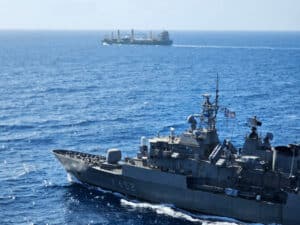
LNG bunkering could be available in Australia by 2016
Written by Nick Blenkey MARCH 1, 2013 — LNG bunkering could be a reality in Australian ports by 2016, says a study by a joint industry project (JIP). The study sees no significant legal restrictions hindering development of Liquid Natural Gas (LNG) bunkering in Australian ports and finds that pay back periods for the investments needed for LNG shipping would be attractive.
MARCH 1, 2013 — LNG bunkering could be a reality in Australian ports by 2016, says a study by a joint industry project (JIP). The study sees no significant legal restrictions hindering development of Liquid Natural Gas (LNG) bunkering in Australian ports and finds that pay back periods for the investments needed for LNG shipping would be attractive.
Bunkering with 4 inch flexible hose to platform support ship in Norway
The JIP focused on LNG fueled tugs and OSVs and was managed by DNV with nine partners in Australia.
The JIP report says that with proper combinations of bunkering solutions such as tank trucks, permanent tanks and barges in the different ports, efficient LNG bunkering can be established.
The partners in the JIP — Australian Maritime Safety Authority (AMSA), BOC Limited (Linde Group), Farstad Shipping Pty. Ltd., Ports Australia, Rolls-Royce Marine AS, SVITZER Australia, Swire Pacific Offshore Operations (Pte) Ltd., Teekay Shipping (Australia) Pty. Ltd., Woodside Energy Ltd. and DNV — are optimistic about the future of LNG as maritime fuel in Australia after having screened the possibilities of establishing LNG bunkering in ten Australian ports.
The JIP calls for more technical guidelines and establishment of a clearer regulatory framework to be established, along with financial incentives to kick-start the development.
When establishing LNG bunkering, the critical business phase is the first 2-4 years of operation when the LNG suppliers rely on a few brave ship owners willing to be industry forerunners. After some years of successful operation a second wave of ships is expected to enter the market, which will reduce suppliers’ uncertainty and reinforce the business case. The JIP focused specifically on the initial phase, and created roadmaps for necessary action for most rapid establishment of LNG bunkering in shortlisted ports. An accelerated approach could open up LNG bunkering in Australia by 2016.
DNV Maritime Country Manager, Tim Holt, says: “We have been impressed with the interest and commitment shown by the Australian shipping industry in investigating LNG as a cleaner and locally available marine fuel.” JIP Project Manager Henning Mohn adds, “Increasing LNG production along with new international regulations boost the interest in LNG fueled shipping; this may actually to some extent switch ships from fueling with imported fuel to using domestically produced LNG.”
While the main report is owned by the JIP partners, a summary report is available HERE





Leave a Reply
You must be logged in to post a comment.